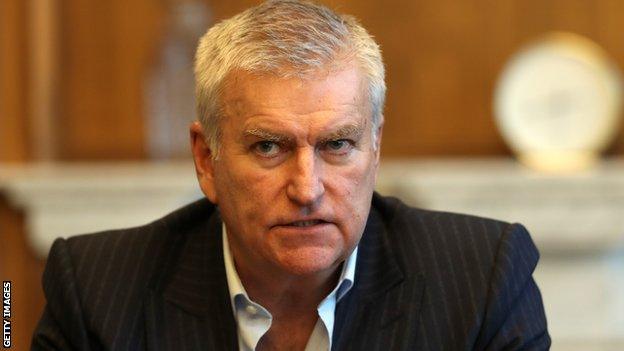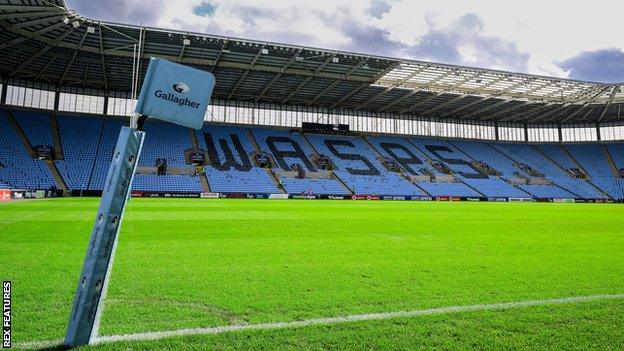Bill Sweeney: RFU chief executive determined to sort 'broken' English game
- Published

Bill Sweeney says he wants to help usher in a new era in the English game based on "strong governance"
Bill Sweeney, the Rugby Football Union chief executive, says the current model in English rugby is "broken" and clubs have been "living beyond their means" for too long.
The financial governance of the sport is under growing scrutiny in the wake of the crisis at Worcester and Wasps.
Worcester have been relegated and suspended while Wasps are set to follow them into administration in "days".
Sweeney pledged to establish a new foundation and "sort the game out".
With the Premiership already thrown into turmoil by the loss of Worcester and likely departure of Wasps, the financial viability of the league has come sharply into focus.
It comes as fellow Premiership side London Irish dismissed reports, external that Wasps could make a return to London as part of a potential merger with them, but the Exiles reinforced that their principal shareholder Mick Crossan would give up his shares to any new owner who would "guarantee the security of the club".
Clubs 'must be able to at least break even'
Simon Massie-Taylor, the chief executive of Premiership Rugby, has already called for the need for "greater transparency" and warned there was no "quick-fix" to the situation.
While circumstances at Worcester and Wasps were not helped by the impact of the pandemic, Sweeney said warning signs have been there for a number of years.
"PRL clubs were losing £4m-5m a year prior to going into Covid and Covid has exacerbated that," he said.
"Post-Covid's challenging economic environment has added to further pressure in that area. Some clubs have had more precarious business models than others and I think we're seeing the outcome of that at the moment.
"We've known for some time this is a sport that's been living way beyond its means and has been relying on wealthy benefactors for some time.
"Those benefactors are passionate about the game and they haven't been making a profitable return on their near £200m that they pump into the Premiership annually."
Sweeney added he wants to see a structure in place where teams can "at least break even" as well as "attract new investment".
"We're seeing the effects of a system that's been broken for some time. I don't think there's a short-term solution we could impose now," he said.
"We need to set the foundation and set the course to really sort the English game out for the long term."

Wasps have struggled to repay the £35m in bonds raised to fund their relocation to Coventry from London in 2014
Six-time Premiership winners and twice European champions Wasps are set to confirm administration early next week with debts running into tens of millions of pounds - a move that would see them relegated under RFU rules.
Worcester continue to fight for their survival with their administrators close to naming a preferred bidder to buy the club.
Sweeney says, although the situation at both clubs is "painful" the RFU cannot step in with an injection of cash.
"One of those solutions isn't the RFU purely funding losses. They are business that are run independently and are responsible for their own finances and cost controls and we cannot simply come in and bail them out," he said.
"We're all determined to change the rugby landscape in England. To grow commercial revenue and develop a sustainable rugby model that has the right governance in place, which includes better financial transparency and improve player welfare and drive whole game success."
Adopting elements of the French model
Sweeney said he favours establishing a structure similar to the one that operates in France.
There the game's financial health is policed by the DNACG - a body, independent of the French Rugby Federation (FFL) and the French National Rugby League (LNR), that safeguards the finances of the 30 professional clubs in the Top14 and Pro D2.
"They define themselves as there to grow and protect the interests in the French game," Sweeney said, before highlighting the criteria each of the 30 clubs must meet in order to get a "licence to compete" - the right to start the season.
"They have to have a complete review of their financial projections and business plan, their assumptions around ticketing and hospitality - if they look out of whack to previous years they are scaled back," he said.
"They look at their projected finish in the league - which carries a bonus payment - and if they've finished no higher than ninth for the last 10 years and then say they're going to finish third that gets challenged."
French clubs also have to keep 15% of their yearly cost projections in cash in the bank and any benefactor wanting to cover losses must supply a bank guarantee.
Sweeney said the English game "needed something like that" in place.
A smaller Premiership, a more 'viable' Championship
A reduction in the size of the Premiership as a way forward has already been suggested by the league with Sweeney agreeing it was "viable" and there was a "clear financial benefit" around fewer teams getting a bigger slice of broadcasting and commercial revenues.
"The clear intention there is that we'll be able to drive more value through less volume - and you'll have better quality volume that will drive better quality value as well," he said.
Sweeney also endorsed the idea of revamping the Championship to close the "huge" financial gap between the top two divisions and making it a "viable competition for a Premiership club to drop down into" capable of supporting clubs with top-flight ambitions to grow responsibly.
"I want to end the myth that we're anti-Championship or the second tier," Sweeney said. "I can understand why the myth's developed but the endless funding into the previous model was not the answer."
Although current funding from the RFU has dropped from £6.5m in 2017 to £1.5m, Sweeney says the fact that 14 of the 17 teams relegated from the Premiership in that time have come straight back up shows the model "wasn't working" and the RFU couldn't justify "pumping money into clubs that were losing money".
Any fundamental changes to the game's structure would also focus on the relationship between club and international calendars with Sweeney adamant it was a "major priority" to avoid any clashes, saying overlapping "doesn't help anybody".
No changes are expected before the start of the 2024-25 season, with Sweeney clear there was a "collective will to fix the situation".
"I believe we will come through this stronger and in better shape. I don't see this as the demise of our game over the longer term.
"This next era has got to be about strong governance, sustainability and player welfare. It's time to be decisive and take advantage of the opportunities that come out in this very difficult time."